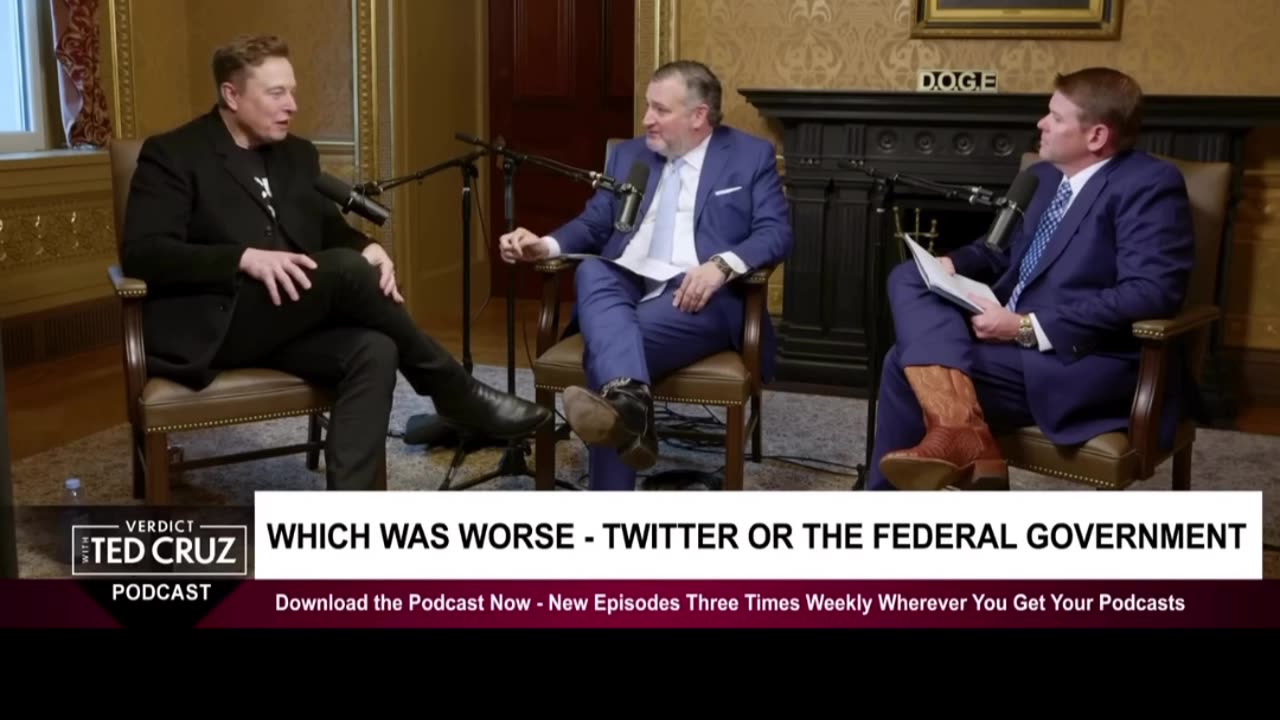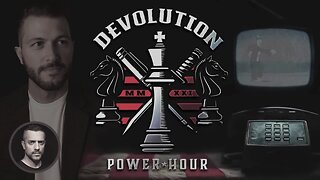Premium Only Content

Which was worse, the mess you found at Twitter or the one at the federal government?
Ted Cruz: "Well, let me start with a question you know a lot about. Which was worse, the disaster you found on Twitter or the disaster you found in the federal government?"
Elon Musk: "Well, it's hard to compete with the federal government."
Ted Cruz: "What surprised you about the federal government? I guess you went in and assumed it was bad. Is it worse than you expected?"
Elon Musk: "It's worse than I expected, but on the positive side, that means there's more opportunity for improvement. So, if you look on the bright side, there’s actually a lot of opportunity to improve federal government spending because it’s so bad. If it were a well-managed ship, it would be very hard to improve.
So, like, but, you know? So now it’s like people are saying, well, how are you going to figure out how to save money in the federal government? Well, it’s like being in a room where the walls, the ceiling, and the floor are all targets. So, you should shoot in any direction you can."
Ted Cruz: "Wow."
Elon Musk: "So I'm sure you'd agree."
The Department of Government Efficiency (DOGE) is a presidential advisory commission established in January 2025 during the second term of President Donald Trump. Its primary mission is to restructure the federal government and eliminate regulations with the goal of reducing spending and increasing government efficiency. Elon Musk, the entrepreneur known for his leadership in companies like Tesla and SpaceX, was appointed to head this department.
One of DOGE's first actions was the proposal to dissolve the United States Agency for International Development (USAID) in an effort to reduce public spending. This decision was made without proper legislative approval, leading to judicial intervention. A federal judge issued a preliminary injunction blocking the dissolution of USAID, arguing that DOGE's actions likely violated the U.S. Constitution, as Congress had not been consulted on the elimination of an agency it had established.
Additionally, DOGE has been criticized by experienced federal auditors, who point out that its approach lacks proper procedures and does not follow standard auditing practices. Errors have been identified in DOGE’s reports, and some experts suggest that its actions may be contributing to inefficiencies and mismanagement rather than improving government efficiency.
In response to these criticisms, Elon Musk has defended DOGE’s actions, emphasizing that the scale of waste identified in federal spending presents a significant opportunity for improvement. Musk stresses that addressing these issues is essential for optimizing the use of public resources.
The creation of DOGE and its subsequent actions reflect an aggressive approach toward reducing the size of the government and eliminating programs deemed inefficient. However, the implementation of these policies has generated controversy, with debates over their legality, effectiveness, and impact on key agencies such as USAID. The situation continues to evolve, and future DOGE decisions are expected to undergo more detailed scrutiny by lawmakers, auditors, and the public.
-
 1:24
1:24
Gateway Hispanic
11 hours ago(México) Representantes de Morena y el PRI se fueron a los golpes en plena sesión del Senado
4 -
 10:34:09
10:34:09
Rallied
12 hours ago $16.22 earnedSolo Challenges ALL DAY
244K8 -
 1:39:43
1:39:43
Brandon Gentile
2 days agoTOP Money Expert: Bitcoin Will Keep Setting All-Time Highs Beyond $10m
5.32K -
 2:02:28
2:02:28
Badlands Media
1 day agoDevolution Power Hour Ep. 385: Trump “Death” Hoax, Supreme Court Tariffs Fight, and Tech-Military Ops
59.4K25 -
 1:56:48
1:56:48
Tundra Tactical
6 hours ago $11.00 earnedFull Semi-Auto Comedy Hour
27.5K2 -
 2:07:31
2:07:31
The Connect: With Johnny Mitchell
15 hours ago $6.30 earnedSecrets Of The Cocaine Cowboys: Miami Drug Lord Reveals Truth About His BILLION-DOLLAR Coke Empire
27K1 -
 1:55:52
1:55:52
BlackDiamondGunsandGear
1 day agoGlocks Want Gun Control? // Trump Tramples on your Rights? // After Hours Armory
27.6K3 -
 1:55:52
1:55:52
DLDAfterDark
10 hours ago $3.21 earnedDLD Live! Trump - Flag Burning - Glock & Gun Control - Martial Law Light?? - After Hours Armory
22.7K3 -
 13:46:18
13:46:18
GritsGG
17 hours agoRumble Customs! 3515 Ws! 🫡!
92.9K -
 5:59:47
5:59:47
SpartakusLIVE
12 hours agoThe HUGEST Brain (not forehead) delivers Saturday SPARTOONS || Variety Later - Shadow of Mordor
196K4